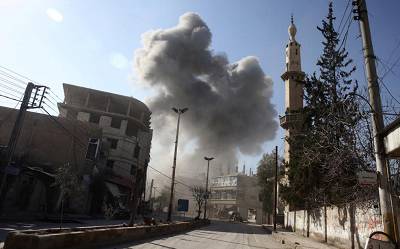Syrian regime forces have launched a ground and air offensive in Eastern Ghouta, witnesses said, hours after the UN Security Council voted unanimously in favor of a resolution calling for a 30-day ceasefire in Syria.
Bashar al-Assad's forces began fighting opposition groups from multiple fronts in the opposition enclave near Damascus, while Syrian warplanes continued to shell the besieged area for the eighth consecutive day.
Al Jazeera's Osama Bin Javid, reporting from Gaziantep in neighboring Turkey, said there were multiple attempts by the regime to "storm" the area from several sides.
Opposition sources in control of the enclave were resisting the attacks, Bin Javid reported, saying the fighters struggled to hold their positions on multiple fronts.
The ceasefire's aim was to evacuate residents of the Damascus suburb, which is under siege, and to allow for the flow of food aid and medicine.
Last week, deadly air strikes and artillery fire launched by Russian-backed Syrian forces exacerbated a dire humanitarian crisis in the besieged enclave, home to some 400,000 people.
According to the Syrian Observatory for Human Rights (SOHR), more than 500 civilians lost their lives as a result of the aerial bombardment campaign that began on February 18.
"It is worth noting that before this [ground offensive] began, there has been relentless bombardment in many of the places in Eastern Ghouta, where those opposition defense lines were" Bin Javid said.
Eastern Ghouta is the last remaining opposition-held area east of Damascus and has been under siege by Bashar al-Assad's forces since 2013, in an attempt to drive opposition forces out.
According to Bin Javid, regime forces have been "specifically targeting underground tunnels and hideouts".
"It seems that the regime now is adamant to enter Eastern Ghouta."
Syria and its allies, Russia and Iran, are fighting against opposition groups in Idlib province as well - one of the last remaining opposition-held areas in Syria.
Both Eastern Ghouta and Idlib were meant to be two of several "de-escalation zones" agreed upon a year ago by Russia, Iran - both regime allies - and Turkey - a backer of the opposition.
Security Council resolution
The vote on the UNSC resolution, sponsored by Kuwait and Sweden, had been delayed several times as council members tried to convince Russia to agree to its terms.
A meeting was originally scheduled for 11am local time (16:00 GMT) on Friday, but negotiations over the wording of the resolution had its sponsors make amendments to avoid a Russian veto.
As a result, the resolution did not specify a given time for the ceasefire to come into effect.
The UN special envoy for Syria, Steffan de Mistura, had stressed the urgent need for a ceasefire to stop the "horrific heavy bombardment of Eastern Ghouta and the indiscriminate mortar shelling on Damascus".
And earlier this week, the UN and other international bodies expressed outrage at the number of civilian casualties.
Hundreds of thousands of people have died in fighting during Syria's seven-year civil war, and millions have been forced to flee the country.
PHOTO CAPTION
Smoke rises from the rebel held besieged town of Hamouriyeh, eastern Ghouta, near Damascus, Syria, February 21, 2018. REUTERS
Al-Jazeera


 Home
Home Discover Islam
Discover Islam Quran Recitations
Quran Recitations Lectures
Lectures
 Fatwa
Fatwa Articles
Articles Fiqh
Fiqh E-Books
E-Books Boys & Girls
Boys & Girls  Ramadan
Ramadan Fatwa Audios
Fatwa Audios Month of Mercy
Month of Mercy Women
Women Eed Al- Fitr
Eed Al- Fitr Food Recipes
Food Recipes Videos
Videos

 Prayer Times
Prayer Times












